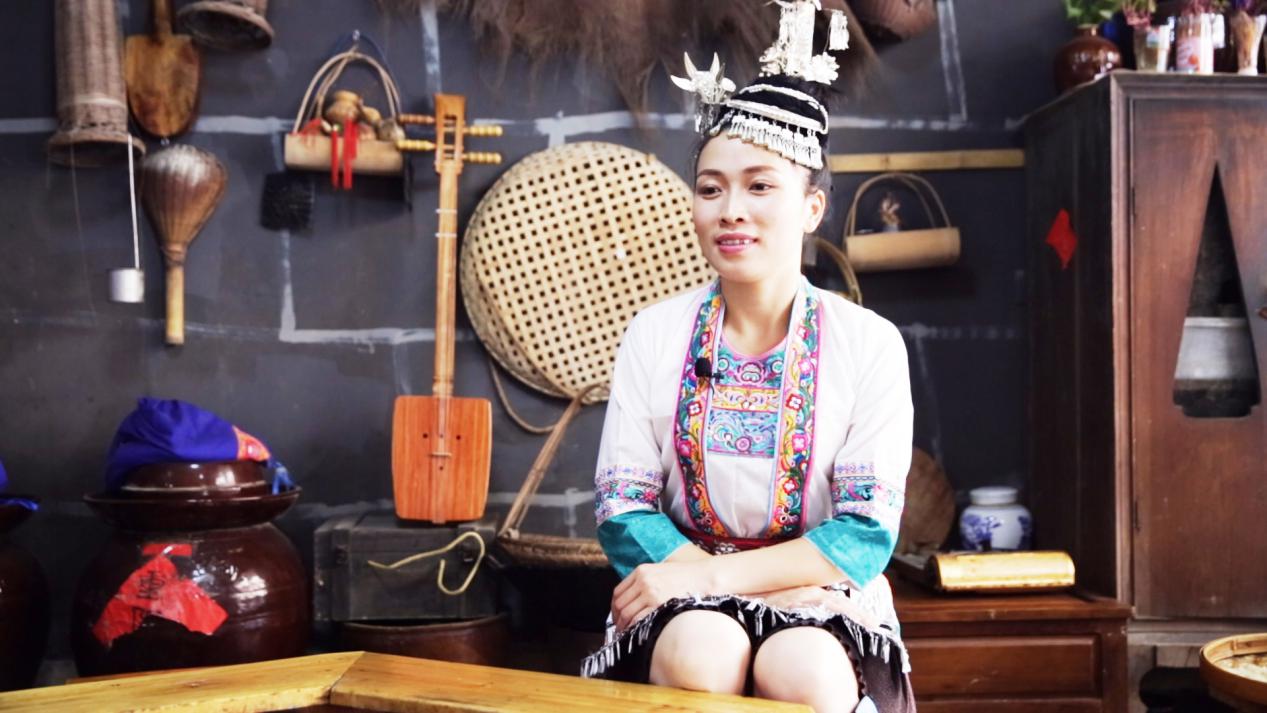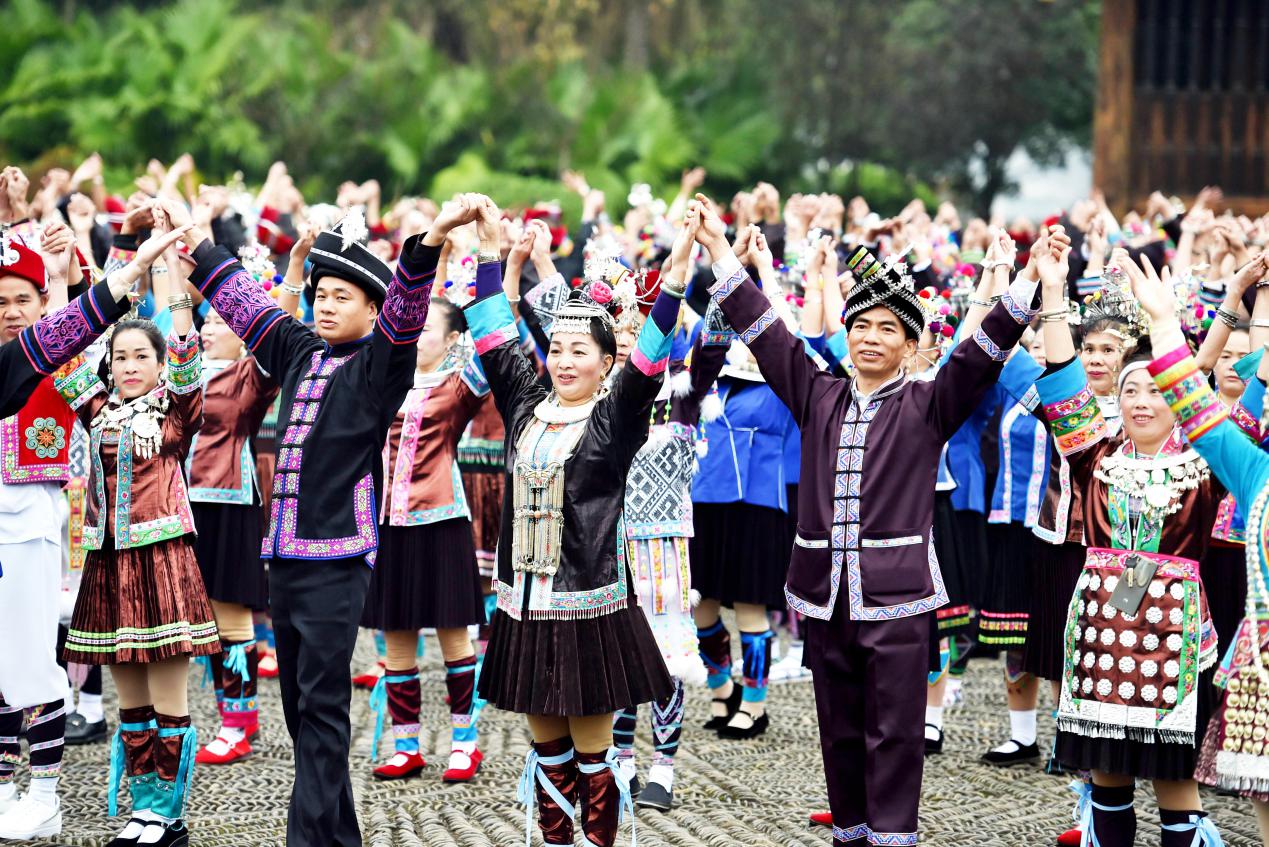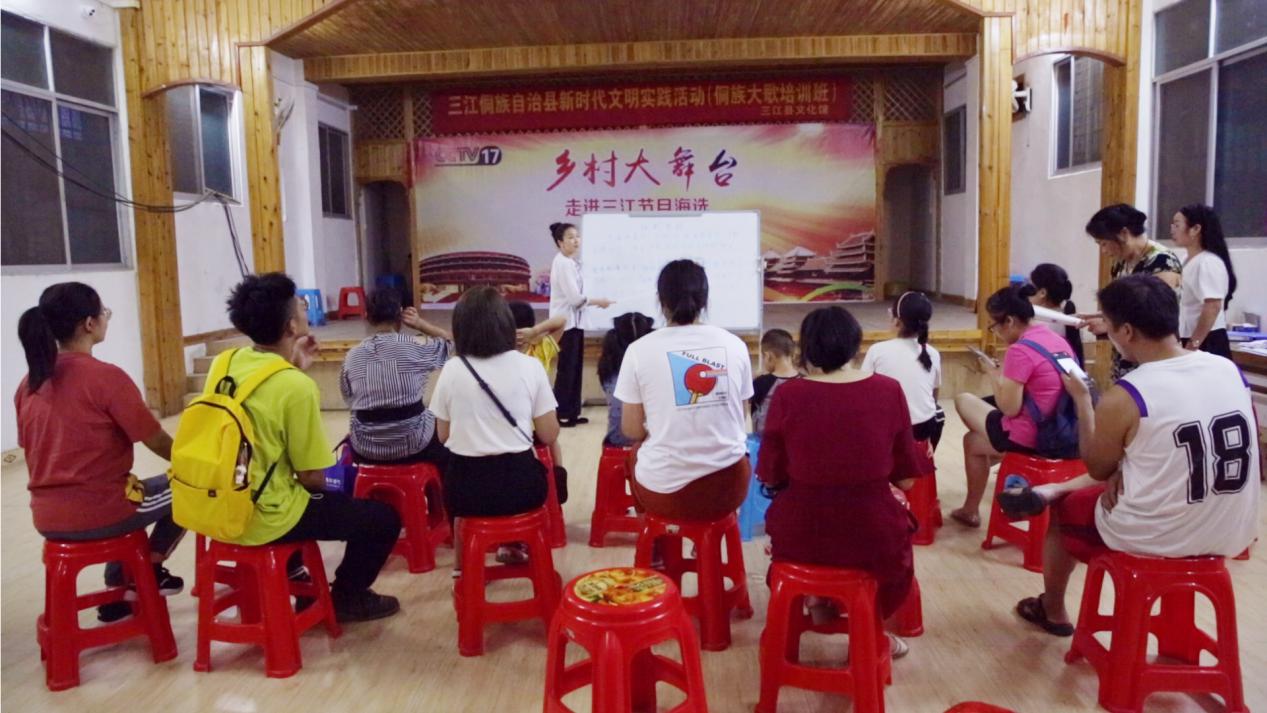Kam Grand Choirs: Ethereal Voice for Millenniums
Publication time:2020-12-14 17:54:02
(By Wang Mengchu)At the junction of Guizhou, Hunan and Guangxi is a land of ethnic minority areas surrounded by mountains and rivers. There are basins and valleys hidden there, which are called Dong in Chinese. And the people among these areas are called Dong People. Dong people, who used to be isolated, have never had an autograph of its own, and did not have a writing system until 1958, therefore, the history and stories of Dong people were all recorded and handed down through songs.
“Where there is a drum tower, there are songs of Dong”, such scenes can be seen everywhere in Dong villages while “As food nourishes body, song nourishes soul” is the spiritual anchor of Dong people. In today's accelerated pace of life, still, under the mulberry trees in this region, the ethereal voice of Dong folk songs have been spreading for thousands of years with the eternal sound of Pipa and Matui Qin ( a kind of stringed instrument looks like a horse leg).

Listen to Kam Grand Choirs on the Internet
“The first time I heard the Kam Grand Choirs were in their village. Suddenly people started singing spontaneously when they were cooking in the kitchen.” In a Dong restaurant, one of Wu Chunyue’s friends recalled and said, “their voice division was very unique — people frying rice formed one part while those burning firewood formed another. It's a pity that I didn’t record it because the equipment was not available then.”

He said that he was going to the village for the festival, 20 years have passed by, and the scene is still fresh in his mind. Wu Chunyue wears Dong clothes with embroidered flowers on it. While talking, she brews a pot of tea with silver ornaments on her head and a pleated skirt on her waist. She is so beautiful and graceful. In the cup is the traditional rattan tea, which emits a light fragrance. People are seated around the fire pool enjoying tea, waiting for the story of Wu and the Kam Grand Choirs.
“He is talking about my hometown, Xinmin Village in Meilin Township, the birthplace of the Kam Grand Choirs in Sanjiang County,” said Wu.
Xinmin village, located on the Bank of Rongjiang River, has many old houses and towering trees where all the girls can embroider and men play Pipa very well. Wu Chunyue, 34, nourishes her voice there and gradually becomes the youngest inheritor of the Kam Grand Choirs in Sanjiang County.
“When I was 18 years old, the village set up the Team of Kam Grand Choirs. My parents, together with more than 20 villagers, went to Beijing to record an album, which was called Oriental Verve. Now there are still CDs for sale on the Internet. By the way, it can also be found on QQ Music.”
I search on QQ Music and find that the album is old and the progress bar can’t be scrolled.
At the end of 2019, the show Autumn of the Eleven Teenagers unfolded a scene of the collision between popular culture and traditional folk customs. The fans have a glimpse of the treasure in the mountain by their idols. They type the names of their idols and Kam Grand Choirs in the search box. Old-fashioned comments are ousted by those of new styles as well. Opening the comment column, it is surprising that the most-liked comment of the first single song named Song of Cicadas is the epitome of online Fans’ community culture — “thank this group (a Chinese idol group) for letting me know about the excellent traditional culture of the Chinese nation.”
Actually, the collision between Kam Grand Choirs and the Internet is nothing new.
Early in August 2018, Baidu, an Internet company, invited more than a dozen Dong children to attend the company’s annual party. At the party, the staff showed their artificial intelligence, while the children showed their amazing voices by singing the Kam Grand Choirs that was when the most traditional songs met the most cutting-edge technology. The children’s performance was as calm as in the Drum Tower. In contrast, the engineers were extremely excited and recorded Kam Grand Choirs as videos to upload to their Moments.
The Kam Grand Choirs is like poems of Li Bai
“My parents actually sing better than me, especially many traditional songs.” Wu said that the Song of Cicadas belongs to “imitative songs” in which the performer mimics the sounds from nature. Pleasant to hear and easy to understand, the imitative songs with changeable melody are most popular among the public.
However, in fact, among traditional Kam Grand Choirs of Dong, the imitative song is just a performance that tests performers’ virtuosity. Mostly, what tourists hear in the Dong village or the singing competitions are imitative songs. “The difficulty of Kam Grand Choirs lies in the lyrics. Dong language is very complicated. Just like Li Bai’s poems, they can be well-known, but also can be the songs of a highbrow type that few people can join in the chorus.”
Wu’s words remind me of what Deng Minwen, a Dong scholar, once said that “most of these young and middleaged people who can sing Kam Grand Choirs only sing those short and popular ones, which are just superficial ones of Kam Grand Choirs of Dong.”
“The song I taught is also a very introductory song”, talking about her public welfare training class, Wu said with a hoarse voice.

Clear and sweet, Wu’s singing is lingering around the cultural center of Sanjiang County. When entering the hall, there were several rows of students sitting inside and outside the classroom. Among the students, there were elders with reading glasses, office workers and primary school students with schoolbags on their backs.
Tips:
The repertoire includes a range of genres such as ballads, children’s songs, songs of greeting and imitative songs. Taught by masters to choirs of disciples, Kam Grand Choirs are performed formally in the drum-tower, the landmark venue for rituals, entertainment and meetings in a Dong village, or more spontaneously in homes or public places. They constitute a Dong encyclopedia, narrating the people’s history, extolling their belief in the unity of humans and nature, preserving scientific knowledge, expressing feelings of romantic love, and promoting moral values such as respect for one’s elders and neighbors.
She is a singer as well as an inheritor
We seem to forget that Wu Chunyue is still a singer besides the inheritor.
In 2007, Wu and her husband went to Shenzhen for work. They were both fresh in the prosperity of the big city, but also suffering from loneliness because no one there singing Kam Grand Choirs. However, She then may never believe that a phone call in the near future would change her whole life.
Wu said, “A few months after I arrived in Shenzhen, my teachers in Sanjiang suddenly called me and said that they were going to organize a team for the 13th National Young Singers’ Competition held by CCTV and asked me whether I would participate. I would never let go of such a good opportunity!”

In 2008, Wu Chunyue's team participated in the competition and won the Group Excellence Award; in 2010, she was invited to participate in Shanghai Rong’an Golden Orange Promotion Conference to sing Kam Grand Choirs; in 2014, she won the first prize in the sixth Rural Art Show in Sanjiang County.
It was not until 2015 that Wu was awarded “Inheritor of the Kam Grand Choirs”. Her pace on the singing track gradually slowed down and left more energy to the inheritance training course.
I asked Wu if she was paid. She said she had subsidies.
“The county troupe has been cancelled, so we, the younger inheritors, should take the lead in many things. Others joke that our team is a “boss team”, because we have our own business as usual. For me, I opened this restaurant.”
At the entrance of the corridor is a wall of Dong culture with Pipa, Matui Qin and other Dong musical instruments hanging on it. There are also two signs, one of which says “Kam Grand Choirs Experience” and the other “National Cultural Exchange”.
When we left the restaurant, we wanted to listen to Wu singing Kam Grand Choirs. She asked us which one we wanted to listen to. I was worried about Wu Chunyue’s voice, so I chose the simplest one — First Arrival in Your Village.
Source: China-ASEAN Panorama

